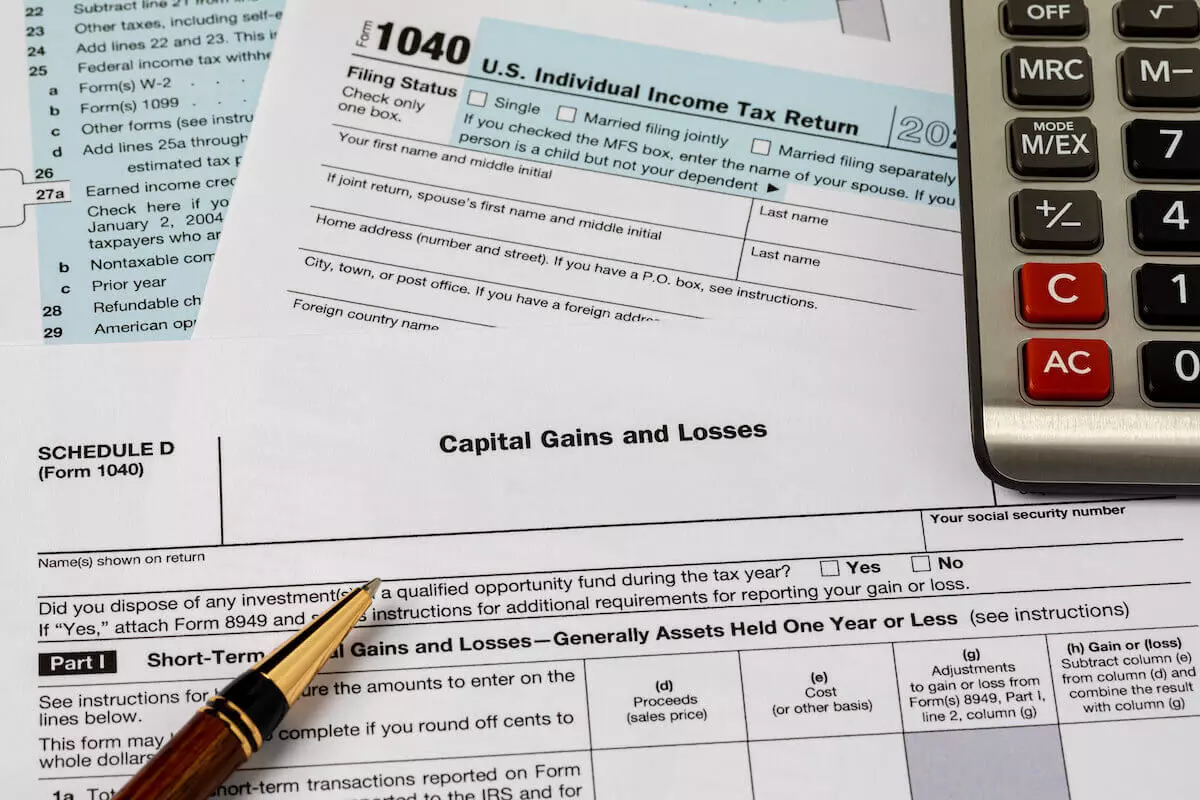If you're considering selling property in Texas, one important aspect to understand is the capital gains tax implications. While Texas does not impose a state capital gains tax, it's crucial to be aware of the federal tax obligations that may apply. In this article, we'll explore the key facts and takeaways regarding capital gains tax in Texas and provide insights into exemptions and strategies that can help reduce or eliminate your tax liability.
Understanding Capital Gains Tax in Texas
Capital gains tax is a tax on the profit earned from the sale of a capital asset, such as real estate, stocks, or other types of property. While Texas does not impose a state-level capital gains tax, you may still be liable for federal capital gains taxes when selling land or property in Texas. However, there are exemptions and strategies available that can help reduce or eliminate your tax liability.
 Image: What is Capital Gains Tax?
Image: What is Capital Gains Tax?
Proposition 4, also known as the Texas Income Tax Amendment, prevents the implementation of a personal state income tax without voter approval. This gives Texas a competitive edge over states with higher capital gains tax rates, such as California, Oregon, and Minnesota.
Federal vs. State Capital Gains Taxes
In Texas, there is no state capital gains tax, which means you only need to pay capital gains taxes to the federal government. The tax rates for long-term capital gains range from 0% to 20%, depending on your income and the type of asset. Short-term capital gains are taxed at the same rates as ordinary income.
 Image: Short-Term vs. Long-Term Capital Gains Tax
Image: Short-Term vs. Long-Term Capital Gains Tax
It's important to understand the difference between federal and state capital gains taxes to make informed decisions when selling property in Texas.
How Texas Compares to Other States
Texas is known for its favorable tax environment, as it does not impose a state-level capital gains tax. In comparison, states like California, Oregon, and Minnesota have significantly higher capital gains tax rates, ranging from 9.85% to 13.3%. This makes Texas an attractive location for property investment and sales, as the tax burden is considerably lower.
Texas shares this advantage with states like Florida, which also does not impose a capital gains tax at the state level. By understanding how Texas compares to other states in terms of capital gains tax rates, you can make better-informed decisions when investing in or selling property.
Types of Capital Gains: Short-Term and Long-Term
There are two types of capital gains: short-term and long-term. Short-term capital gains refer to profits earned from the sale of an asset held for less than a year, while long-term capital gains refer to profits derived from the sale of an asset held for more than a year.
The tax rates for these gains vary. Short-term capital gains are taxed as ordinary income, while long-term capital gains are typically taxed at either 15% or 20%, depending on your income tax bracket.
Understanding the difference between short-term and long-term capital gains is essential to minimize your tax liability when selling property in Texas.
Exemptions and Strategies for Reducing Capital Gains Tax in Texas
There are several exemptions and strategies available in Texas to reduce or avoid capital gains tax. One of the most common exemptions is the primary residence exemption. To qualify for this exemption, the house must have been your primary residence for at least two years, and you must meet certain residency and exemption criteria.
By meeting these requirements, you can potentially exclude up to $250,000 (if single) or $500,000 (if married filing jointly) of profit from the sale of your primary residence from capital gains tax. This exemption can significantly reduce or eliminate your tax liability.
Another strategy is to utilize a Section 1031 exchange, which allows for a tax-deferred exchange of "like-kind" properties. This can be advantageous when reinvesting the proceeds from the sale of a property into a more lucrative one.
Income-based exemptions are also available in Texas. Sellers with an annual taxable income falling into the 0% capital gains tax income bracket are exempt from taxation on net capital gains. Staying informed about the current income thresholds and requirements can help you predict your potential tax burden and choose the right time to sell your home.
 Image: How to Avoid Capital Gains Tax
Image: How to Avoid Capital Gains Tax
Calculating Your Capital Gains Tax Liability in Texas
To calculate your capital gains tax liability in Texas, you need to determine your net capital gains. This is the difference between the total long-term capital gain and the total short-term capital loss for the year, taking into account any expenses or losses incurred from capital assets.
Once you've determined your net capital gains, you can apply any exemptions or strategies to reduce your tax liability. It's crucial to accurately calculate your net capital gains and take advantage of available exemptions to ensure you're paying the appropriate amount of tax.
 Image: How to Calculate Capital Gains Tax in Texas
Image: How to Calculate Capital Gains Tax in Texas
Selling Inherited Property in Texas: Capital Gains Tax Implications
When selling inherited property in Texas, you may be subject to capital gains tax. It's important to understand the difference between inheritance tax and capital gains tax. Inheritance tax is a tax on the transfer of property or assets upon the death of an individual, while capital gains tax is a tax on the profit earned from the sale of an asset.
Texas does not have an inheritance tax, but when selling inherited property, you may still be liable for federal capital gains tax. Calculating the capital gains tax on inherited property requires determining the net capital gains, which is the difference between the property's stepped-up cost basis (its value on the day it was inherited) and the final sale price.
By accurately calculating the capital gains tax on inherited property in Texas, you can ensure you're paying the correct amount of taxes and taking advantage of any available exemptions or strategies.
Reporting Capital Gains Tax on Texas Property Sales
When reporting capital gains tax on Texas property sales, you'll need to file the appropriate federal tax forms and maintain accurate records. The federal tax forms used for reporting capital gains tax are Form 8949 and Schedule D. Form 8949 helps differentiate between short-term and long-term capital gains and losses, while Schedule D (Form 1040) is used to summarize the information and calculate your total capital gains tax liability.
It's essential to accurately complete and file these forms, as well as maintain accurate records of your property transactions. Proper recordkeeping allows you to calculate your tax liability correctly, take advantage of available exemptions, and comply with tax laws.
 Image: How Do I Report Capital Gains on My Taxes?
Image: How Do I Report Capital Gains on My Taxes?
Navigate Capital Gains Tax in Texas With Ease
Understanding the intricacies of capital gains tax in Texas is essential for making informed decisions when investing in or selling property. By being aware of the exemptions and strategies available, you can potentially save thousands of dollars in taxes and maximize your return on investment.
Always remember to consult with an attorney, tax, or financial advisor before proceeding with any real estate transaction. They can provide personalized guidance and ensure compliance with tax laws.
Frequently Asked Questions
Q: How do I avoid capital gains tax? To minimize or avoid capital gains taxes, it's often wise to invest for the long term, as the tax rates for long-term gains are usually lower than for short-term gains. Additionally, using capital losses to offset gains and taking advantage of relevant exemptions can help reduce your tax burden.
Q: Are all capital gains taxed at 15%? No, not all capital gains are taxed at 15%. The tax rates for long-term capital gains range from 0% to 20%, depending on your individual income and filing status. For certain types of assets, the tax rate can be as high as 28%, though it won't exceed your ordinary income tax bracket.
Q: Is there a capital gains tax on selling a house in Texas? Yes and no. Texas does not have a state-level capital gains tax due to the absence of income taxes. However, sellers may still need to report and pay federal capital gains taxes when selling property.
That said, many home sellers in Texas qualify for the primary residence exemption, which allows them to exclude a significant portion of their profit from being taxed. Most sellers are only liable for capital gains taxes if they make more than $250,000 (single) or $500,000 (married filing jointly) in profit from the sale of their primary residence.
Q: How much tax do you pay when selling a rental property in Texas? The capital gains tax rate for rental properties in Texas is the same as for other types of property. The federal tax rate for long-term capital gains is based on your income tax bracket, while short-term gains are taxed at the same rate as ordinary income. However, rental properties do not qualify for the primary residence exemption.
Additionally, sellers of rental properties may need to pay depreciation recapture tax, which taxes the cumulative depreciation deductions that were previously taken on the property.
Q: What is the primary residence exemption for capital gains tax in Texas? The primary residence exemption allows homeowners to exclude up to $250,000 (single) or $500,000 (married filing jointly) of profit from the sale of their primary residence from capital gains tax. To qualify, homeowners must have owned and resided in the home for at least two of the past five years, among other criteria.
The primary residence exemption can be a great way to save money when selling a home. However, it's important to consult with a tax advisor if your situation is changing or has recently changed, as certain circumstances may impact your eligibility for the higher exemption amount.
For informational purposes only. Always consult with an attorney, tax, or financial advisor before proceeding with any real estate transaction.











